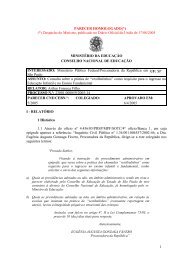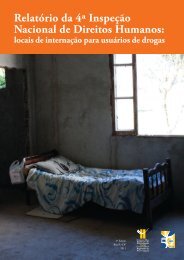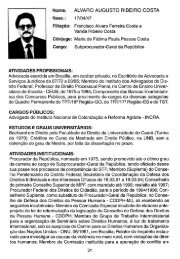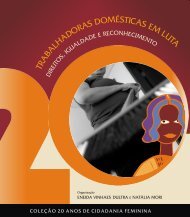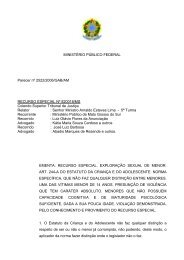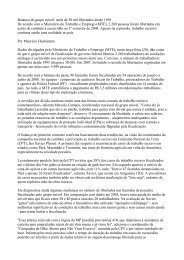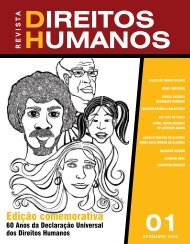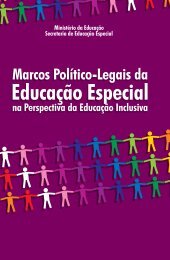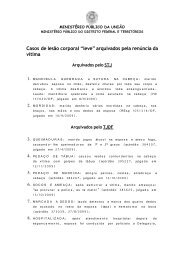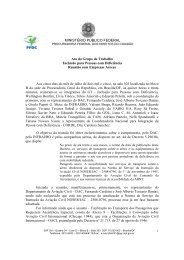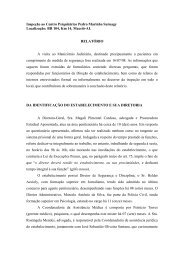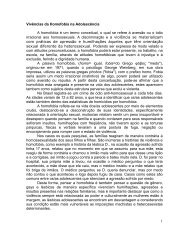- Page 1 and 2:
MINISTÉRIO PÚBLICO FEDERAL PROCUR
- Page 3 and 4:
Lista de Participantes e Colaborado
- Page 5 and 6:
1. INTRODUÇÃO - Sistematização
- Page 7 and 8:
2. PRIMEIRA PARTE - Estruturação
- Page 9 and 10:
a aplicação de penas alternativas
- Page 11 and 12:
De sua vez, as Defensorias Pública
- Page 13 and 14:
Deliberou-se diminuir o impacto or
- Page 15 and 16:
dos Palmares/AL, Crateús/CE, Iguat
- Page 17 and 18:
2.6.2.1. Cargos Efetivos Para se po
- Page 19 and 20:
Onde: nº Ts = número de técnicos
- Page 21 and 22:
12 (doze) cargos em comissão do Gr
- Page 23 and 24:
Finalmente, note-se que o aumento d
- Page 25 and 26:
3. SEGUNDA PARTE - Atualização da
- Page 27 and 28:
4. TERCEIRA PARTE - Fortalecimento
- Page 29 and 30:
ANEXO I (previsão de demanda repri
- Page 31 and 32:
ANEXO III (Estrutura da Defensoria
- Page 34 and 35:
ANEXO V (previsão de criação de
- Page 36 and 37:
CE 2004 355 - - 112.899 318 DF 2004
- Page 38 and 39:
Cria, no âmbito da Defensoria Púb
- Page 40 and 41:
identificada, a ser absorvida nas h
- Page 42 and 43:
ANEXO I ESTRUTURA DE CLASSES E PADR
- Page 44 and 45:
) Cargos de nível intermediário d
- Page 46 and 47:
Cargos de nível superior, intermed
- Page 48 and 49:
ANEXO V EXERCÍCIO DE 2006 Cargos E
- Page 50 and 51:
Tabela Remuneratória da Carreira d
- Page 52 and 53:
Justificativa para o Remanejamento
- Page 54 and 55:
dar sua parcela de efetiva contribu
- Page 56 and 57:
DECRETO Nº DE DE DE 2005. Dispõe
- Page 58 and 59:
2. Departamento de Pesquisa, Análi
- Page 60 and 61:
) atos pelos quais se vá reconhece
- Page 62 and 63:
I - subsidiar a definição das pol
- Page 64 and 65:
Art. 20. Ao Departamento de Elabora
- Page 66 and 67:
III - planejar, coordenar, dirigir
- Page 68 and 69:
XIII - propor e participar da elabo
- Page 70 and 71:
XII - determinar correições extra
- Page 72 and 73:
9 FG-2 Secretaria-Executiva do Cons
- Page 74 and 75:
Coordenação Divisão 2 Coordenado
- Page 76 and 77:
Gabinete 1 Chefe 101.4 3 Assessor T
- Page 78 and 79:
Gabinete 1 Chefe 101.4 2 Assistente
- Page 80 and 81:
Coordenação-Geral do Sistema Info
- Page 82 and 83:
Divisão 2 Chefe 101.2 Coordenaçã
- Page 84 and 85:
Divisão Serviço 3 Chefe 101.2 3 C
- Page 86 and 87:
Superintendência Regional 27 Super
- Page 88 and 89:
Defensoria Pública-Geral da União
- Page 90 and 91:
CÓDIGO DAS- SITUAÇÃO ATUAL SITUA
- Page 92 and 93:
Situação Atual do Quadro de DAS d
- Page 94 and 95:
Altera os dispositivos do caput do
- Page 96:
MINISTÉRIO PÚBLICO FEDERAL PROCUR
- Page 106 and 107: MINISTÉRIO PÚBLICO FEDERAL PROCUR
- Page 108 and 109: MINISTÉRIO PÚBLICO FEDERAL PROCUR
- Page 110 and 111: MINISTÉRIO PÚBLICO FEDERAL PROCUR
- Page 112 and 113: MINISTÉRIO PÚBLICO FEDERAL PROCUR
- Page 114 and 115: MINISTÉRIO PÚBLICO FEDERAL PROCUR
- Page 116 and 117: MINISTÉRIO PÚBLICO FEDERAL PROCUR
- Page 118 and 119: MINISTÉRIO PÚBLICO FEDERAL PROCUR
- Page 120 and 121: MINISTÉRIO PÚBLICO FEDERAL PROCUR
- Page 122 and 123: MINISTÉRIO PÚBLICO FEDERAL PROCUR
- Page 124 and 125: MINISTÉRIO PÚBLICO FEDERAL PROCUR
- Page 126 and 127: MINISTÉRIO PÚBLICO FEDERAL PROCUR
- Page 128 and 129: MINISTÉRIO PÚBLICO FEDERAL PROCUR
- Page 130 and 131: MINISTÉRIO PÚBLICO FEDERAL PROCUR
- Page 132 and 133: MINISTÉRIO PÚBLICO FEDERAL PROCUR
- Page 134 and 135: MINISTÉRIO PÚBLICO FEDERAL PROCUR
- Page 136 and 137: MINISTÉRIO PÚBLICO FEDERAL PROCUR
- Page 138 and 139: INSTITUTO NACIONAL DO SEGURO SOCIAL
- Page 140 and 141: Caso você receba a mensagem emitid
- Page 142 and 143: • Benefícios com pagamento em Po
- Page 144 and 145: I M P O R T A N T E 1. EVITE RASURA
- Page 146 and 147: MINISTÉRIO PÚBLICO FEDERAL PROCUR
- Page 148 and 149: MINISTÉRIO PÚBLICO FEDERAL PROCUR
- Page 152 and 153: have a relevant specialisation in,
- Page 155 and 156: MINISTÉRIO PÚBLICO FEDERAL PROCUR
- Page 157 and 158: MINISTÉRIO PÚBLICO FEDERAL PROCUR
- Page 159 and 160: MINISTÉRIO PÚBLICO FEDERAL PROCUR
- Page 161 and 162: MINISTÉRIO PÚBLICO FEDERAL PROCUR
- Page 163 and 164: MINISTÉRIO PÚBLICO FEDERAL PROCUR
- Page 165 and 166: MINISTÉRIO PÚBLICO FEDERAL PROCUR
- Page 167 and 168: MINISTÉRIO PÚBLICO FEDERAL PROCUR
- Page 169 and 170: MINISTÉRIO PÚBLICO FEDERAL PROCUR
- Page 171 and 172: MINISTÉRIO PÚBLICO FEDERAL PROCUR
- Page 173 and 174: MINISTÉRIO PÚBLICO FEDERAL PROCUR
- Page 175 and 176: MINISTÉRIO PÚBLICO FEDERAL PROCUR
- Page 177 and 178: MINISTÉRIO PÚBLICO FEDERAL PROCUR
- Page 179 and 180: Interessados GT de Interesse Unidad
- Page 181: Viviane de Oliveira Martinez Segura
- Page 184 and 185: MINISTÉRIO PÚBLICO FEDERAL PROCUR
- Page 186 and 187: RAFAEL BRUM MIRON - PRM/Santa Maria
- Page 188 and 189: MINISTÉRIO PÚBLICO FEDERAL PROCUR
- Page 190 and 191: formulação do orçamento da Uniã
- Page 192 and 193: MINISTÉRIO PÚBLICO FEDERAL PROCUR
- Page 194 and 195: MINISTÉRIO PÚBLICO FEDERAL PROCUR
- Page 196 and 197: MINISTÉRIO PÚBLICO FEDERAL PROCUR
- Page 198 and 199: MINISTÉRIO PÚBLICO FEDERAL PROCUR
- Page 200 and 201:
MINISTÉRIO PÚBLICO FEDERAL PROCUR
- Page 202 and 203:
MINISTÉRIO PÚBLICO FEDERAL PROCUR
- Page 204 and 205:
MINISTÉRIO PÚBLICO FEDERAL PROCUR
- Page 206 and 207:
Estado Unidade Número Autor(es) Da
- Page 208 and 209:
Estado Unidade Número Autor (es) D
- Page 210 and 211:
Esta do Cear á Distr ito Fede ral
- Page 212 and 213:
Esta do Unidade Número Autor (es)
- Page 214 and 215:
Esta do Unidade Número Autor (es)
- Page 216 and 217:
MINISTÉRIO PÚBLICO FEDERAL PROCUR
- Page 218 and 219:
MINISTÉRIO PÚBLICO FEDERAL PROCUR
- Page 220 and 221:
3 MINISTÉRIO PÚBLICO FEDERAL PROC
- Page 222 and 223:
5 MINISTÉRIO PÚBLICO FEDERAL PROC
- Page 224 and 225:
MINISTÉRIO PÚBLICO FEDERAL PROCUR
- Page 226 and 227:
3 MINISTÉRIO PÚBLICO FEDERAL PROC
- Page 228 and 229:
5 MINISTÉRIO PÚBLICO FEDERAL PROC
- Page 230 and 231:
7 MINISTÉRIO PÚBLICO FEDERAL PROC
- Page 232 and 233:
9 MINISTÉRIO PÚBLICO FEDERAL PROC
- Page 234 and 235:
11 MINISTÉRIO PÚBLICO FEDERAL PRO
- Page 236 and 237:
13 MINISTÉRIO PÚBLICO FEDERAL PRO
- Page 238 and 239:
- Horário: 9h às 18h - Local: Gra
- Page 240 and 241:
MINISTÉRIO PÚBLICO FEDERAL PROCUR
- Page 242 and 243:
MINISTÉRIO PÚBLICO FEDERAL PROCUR
- Page 244 and 245:
PORTARIA No 1018/GM DE 1º DE JUL N
- Page 246:
PORTARIA No 1018/GM DE 1º DE JUL f
- Page 268 and 269:
MINISTÉRIO PÚBLICO FEDERAL PROCUR
- Page 270 and 271:
SUMÁRIO 1. Sistematização e Meto
- Page 272 and 273:
cidadania, fomento ao direito que s
- Page 274 and 275:
Já os Defensores Públicos da Uni
- Page 276 and 277:
Federal e no Trabalho, pode-se ter
- Page 278 and 279:
e o ICVJF - Índice de Carência de
- Page 280 and 281:
somatório dos cargos de magistrado
- Page 282 and 283:
elaboração de perícias nas área
- Page 284 and 285:
4 (quatro) cargos em comissão do g
- Page 286 and 287:
Público da União apenas 69% (sess
- Page 288 and 289:
A proposta ora apresentada visa ate
- Page 290 and 291:
Instituição Defensoria Pública d
- Page 292:
ANEXO IV (Estrutura da Defensoria P
- Page 295 and 296:
ANEXO VI (relação entre o número
- Page 297 and 298:
Minuta de Anteprojeto de Estrutura
- Page 299 and 300:
Art. 5º Os cargos de que tratam os
- Page 301 and 302:
ANEXO I Organização da Carreira d
- Page 303 and 304:
ANEXO III Tabela Remuneratória da
- Page 305 and 306:
ANEXO V Tabela de Conversão da Sit
- Page 307 and 308:
ANEXO VII EXERCÍCIO DE 2007 Cargos
- Page 309 and 310:
Minuta de Anteprojeto de Remanejame
- Page 311 and 312:
meio da Administração Superior de
- Page 313 and 314:
Defensoria Pública da União; 8 (o
- Page 315 and 316:
CÓDIGO ANEXO I REMANEJAMENTO DE CA
- Page 317 and 318:
UNIDADE CARGO/ FUNÇÃO Nº DENOMIN
- Page 319 and 320:
UNIDADE CARGO/ FUNÇÃO Nº DENOMIN
- Page 321 and 322:
UNIDADE CARGO/ FUNÇÃO Nº DENOMIN
- Page 323 and 324:
UNIDADE CARGO/ FUNÇÃO Nº DENOMIN
- Page 325 and 326:
UNIDADE CARGO/ FUNÇÃO Nº DENOMIN
- Page 327 and 328:
UNIDADE CARGO/ FUNÇÃO Nº DENOMIN
- Page 329 and 330:
UNIDADE CARGO/ FUNÇÃO Nº DENOMIN
- Page 331 and 332:
UNIDADE CARGO/ FUNÇÃO Nº DENOMIN
- Page 333 and 334:
UNIDADE CARGO/ FUNÇÃO Nº DENOMIN
- Page 335 and 336:
UNIDADE CARGO/ FUNÇÃO Nº DENOMIN
- Page 338 and 339:
Situação Atual do Quadro de DAS d
- Page 340 and 341:
DEFENSORIA PÚBLICA DA UNIÃO CONSE
- Page 342 and 343:
DEFENSORIA PÚBLICA DA UNIÃO CONSE
- Page 344 and 345:
MINISTÉRIO PÚBLICO FEDERAL PROCUR
- Page 346 and 347:
MINISTÉRIO PÚBLICO FEDERAL PROCUR
- Page 348 and 349:
MINISTÉRIO PÚBLICO FEDERAL PROCUR
- Page 350 and 351:
apenas no plano abstrato da lei, in
- Page 352 and 353:
Santos/SP, Bagé/RS, Caxias do Sul/
- Page 354 and 355:
Ainda em 2005, com a criação dos
- Page 356 and 357:
em vias instalação; as 1.378 (um
- Page 358 and 359:
impactar o orçamento do Poder Exec
- Page 360 and 361:
nº de DPUs/UF = número de Defenso
- Page 362 and 363:
presente programa, bem como depende
- Page 364 and 365:
ANEXO I (previsão de demanda repri
- Page 366 and 367:
Ministério Público Militar 2004 6
- Page 368 and 369:
2005 280 1 1 3 508 As 17 60 432 Ts
- Page 370 and 371:
ANEXO IV (relação entre o número
- Page 372 and 373:
TO 2004 42 94 Juízes Estaduais 2,2
- Page 374 and 375:
ANEXO VI (Estrutura da Defensoria P
- Page 376 and 377:
Quadro Resumo de Custos dos Cargos
- Page 378 and 379:
Quantificação de Acréscimo de De
- Page 380 and 381:
PROCURADORIA FEDERAL DOS DIREITOS D
- Page 382 and 383:
MINISTÉRIO PÚBLICO FEDERAL PROCUR
- Page 384 and 385:
MINISTÉRIO PÚBLICO FEDERAL PROCUR
- Page 386 and 387:
Os autores pleitearam o deferimento
- Page 388 and 389:
defesa dos princípios constitucion
- Page 390 and 391:
escravos são parte da cultura bras
- Page 392 and 393:
A duração do programa será de 1
- Page 394 and 395:
alvos preferenciais de discriminaç
- Page 396 and 397:
III. Liberdade de expressão de que
- Page 398 and 399:
de idéias. Não se trata apenas de
- Page 400 and 401:
determinado. Sob este ponto de vist
- Page 402 and 403:
Barbosa Moreira, em artigo sobre o
- Page 404 and 405:
Estado” 33 . Portanto, “em proc
- Page 406 and 407:
Parece-nos admissível, também, o
- Page 408 and 409:
MINISTÉRIO PÚBLICO FEDERAL EXCELE
- Page 410 and 411:
MINISTÉRIO PÚBLICO FEDERAL UNIÃO
- Page 412 and 413:
MINISTÉRIO PÚBLICO FEDERAL Oficio
- Page 414 and 415:
MINISTÉRIO PÚBLICO FEDERAL repres
- Page 416 and 417:
MINISTÉRIO PÚBLICO FEDERAL Anteri
- Page 418 and 419:
MINISTÉRIO PÚBLICO FEDERAL CBN, f
- Page 420 and 421:
MINISTÉRIO PÚBLICO FEDERAL “Na
- Page 422 and 423:
MINISTÉRIO PÚBLICO FEDERAL “pre
- Page 424 and 425:
MINISTÉRIO PÚBLICO FEDERAL Enfim,
- Page 426 and 427:
MINISTÉRIO PÚBLICO FEDERAL aos me
- Page 428 and 429:
MINISTÉRIO PÚBLICO FEDERAL Repeti
- Page 430 and 431:
MINISTÉRIO PÚBLICO FEDERAL fundam
- Page 432 and 433:
MINISTÉRIO PÚBLICO FEDERAL Sendo
- Page 434 and 435:
MINISTÉRIO PÚBLICO FEDERAL respos
- Page 436 and 437:
MINISTÉRIO PÚBLICO FEDERAL temos
- Page 438 and 439:
MINISTÉRIO PÚBLICO FEDERAL Dispõ
- Page 440 and 441:
MINISTÉRIO PÚBLICO FEDERAL sendo
- Page 442 and 443:
MINISTÉRIO PÚBLICO FEDERAL ou pod
- Page 444 and 445:
MINISTÉRIO PÚBLICO FEDERAL A efic
- Page 446 and 447:
MINISTÉRIO PÚBLICO FEDERAL outros
- Page 448 and 449:
MINISTÉRIO PÚBLICO FEDERAL nesta
- Page 450 and 451:
MINISTÉRIO PÚBLICO FEDERAL prazo
- Page 452 and 453:
MINISTÉRIO PÚBLICO FEDERAL c) cit
- Page 454 and 455:
LIMITES AO EXERCÍCIO DA LIBERDADE
- Page 456 and 457:
Convém, de início, precisar o obj
- Page 458 and 459:
declarava que “a religião catól
- Page 460 and 461:
segundo a qual, sendo valiosa a liv
- Page 462 and 463:
direitos de participação polític
- Page 464 and 465:
Em segundo lugar, parece-me que o d
- Page 466 and 467:
excluem o trabalho do conflito e da
- Page 468 and 469:
A primeira delas seria o Estado bra
- Page 470 and 471:
Tratei do assunto em artigo publica
- Page 472 and 473:
difuso). Em perfeita consonância c
- Page 474 and 475:
porque o art. 220, § 1º, faz remi
- Page 476 and 477:
que veicularem campanhas discrimina
- Page 478 and 479:
Dra Diana Franchs Josefa Correia Ba
- Page 480 and 481:
MINISTÉRIO PÚBLICO FEDERAL PROCUR
- Page 482 and 483:
Manual de Atuação em Tutela Colet
- Page 484 and 485:
Manual de Atuação em Tutela Colet
- Page 486 and 487:
Manual de Atuação em Tutela Colet
- Page 488 and 489:
Manual de Atuação em Tutela Colet
- Page 490 and 491:
Manual de Atuação em Tutela Colet
- Page 492 and 493:
Manual de Atuação em Tutela Colet
- Page 494 and 495:
Manual de Atuação em Tutela Colet
- Page 496 and 497:
Manual de Atuação em Tutela Colet
- Page 498 and 499:
Manual de Atuação em Tutela Colet
- Page 500 and 501:
Manual de Atuação em Tutela Colet
- Page 502 and 503:
Manual de Atuação em Tutela Colet
- Page 504 and 505:
Manual de Atuação em Tutela Colet
- Page 506 and 507:
Manual de Atuação em Tutela Colet
- Page 508 and 509:
Manual de Atuação em Tutela Colet
- Page 510 and 511:
Manual de Atuação em Tutela Colet
- Page 512 and 513:
Manual de Atuação em Tutela Colet
- Page 514 and 515:
Manual de Atuação em Tutela Colet
- Page 516 and 517:
Manual de Atuação em Tutela Colet
- Page 518 and 519:
Manual de Atuação em Tutela Colet
- Page 520 and 521:
Manual de Atuação em Tutela Colet
- Page 522 and 523:
Manual de Atuação em Tutela Colet
- Page 524 and 525:
Manual de Atuação em Tutela Colet
- Page 526 and 527:
Manual de Atuação em Tutela Colet
- Page 528 and 529:
Manual de Atuação em Tutela Colet
- Page 530 and 531:
Manual de Atuação em Tutela Colet
- Page 532 and 533:
Manual de Atuação em Tutela Colet
- Page 534 and 535:
Manual de Atuação em Tutela Colet
- Page 536 and 537:
Manual de Atuação em Tutela Colet
- Page 538 and 539:
Manual de Atuação em Tutela Colet
- Page 540 and 541:
Manual de Atuação em Tutela Colet
- Page 542 and 543:
Manual de Atuação em Tutela Colet
- Page 544 and 545:
Manual de Atuação em Tutela Colet
- Page 546 and 547:
Manual de Atuação em Tutela Colet
- Page 548 and 549:
Manual de Atuação em Tutela Colet
- Page 550 and 551:
Manual de Atuação em Tutela Colet
- Page 552 and 553:
Manual de Atuação em Tutela Colet
- Page 554 and 555:
Manual de Atuação em Tutela Colet
- Page 556 and 557:
Manual de Atuação em Tutela Colet
- Page 558 and 559:
Manual de Atuação em Tutela Colet
- Page 560 and 561:
Manual de Atuação em Tutela Colet
- Page 562 and 563:
Manual de Atuação em Tutela Colet
- Page 564 and 565:
Manual de Atuação em Tutela Colet
- Page 566 and 567:
Manual de Atuação em Tutela Colet
- Page 568 and 569:
Manual de Atuação em Tutela Colet
- Page 570 and 571:
Manual de Atuação em Tutela Colet
- Page 572 and 573:
Manual de Atuação em Tutela Colet
- Page 574 and 575:
Manual de Atuação em Tutela Colet
- Page 576 and 577:
Manual de Atuação em Tutela Colet
- Page 578 and 579:
Manual de Atuação em Tutela Colet
- Page 580:
Manual de Atuação em Tutela Colet
- Page 883 and 884:
MINISTÉRIO PÚBLICO FEDERAL PROCUR
- Page 885 and 886:
MINISTÉRIO PÚBLICO FEDERAL PROCUR
- Page 887 and 888:
MINISTÉRIO PÚBLICO FEDERAL PROCUR
- Page 889 and 890:
10, espaçamento simples. ‣ Indic
- Page 891 and 892:
MINISTÉRIO PÚBLICO FEDERAL PROCUR
- Page 893 and 894:
TERMO DE COMPROMISSO DE AJUSTAMENTO
- Page 895 and 896:
i) Elaborar, em conformidade com a
- Page 897 and 898:
Maria de Fátima Moraes - Coordenad
- Page 899 and 900:
MINISTÉRIO PÚBLICO FEDERAL PROCUR
- Page 901 and 902:
doenças; 2) histórico terapêutic
- Page 903 and 904:
pontos, mostrou que, em média, os
- Page 905:
declaren que no han tenido um compo
- Page 908:
Conselho Nacional dos Direitos do I
- Page 911 and 912:
MINISTÉRIO PÚBLICO FEDERAL PROCUR
- Page 913 and 914:
2 13. O Ministério exerce algum co
- Page 915 and 916:
MINISTÉRIO PÚBLICO FEDERAL PROCUR
- Page 917 and 918:
MINISTÉRIO PÚBLICO FEDERAL PROCUR
- Page 919 and 920:
MINISTÉRIO PÚBLICO FEDERAL PROCUR
- Page 921 and 922:
MINISTÉRIO PÚBLICO FEDERAL PROCUR
- Page 923 and 924:
MINISTÉRIO PÚBLICO FEDERAL PROCUR
- Page 925 and 926:
MINISTÉRIO PÚBLICO FEDERAL PROCUR
- Page 927 and 928:
MINISTÉRIO PÚBLICO FEDERAL PROCUR
- Page 929:
! "#$%"!&%& %"!&!'"%"!%%("%!)$ *#



